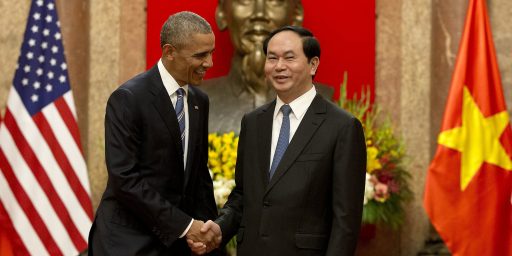Military Families vs. the War
WaPo fronts what would seem a non-story, “Military Families vs. the War.”
The number of military families that oppose Operation Iraqi Freedom, though never measured, is probably small. But a nascent antiwar movement has begun to find a toehold among parents, spouses and other relatives of active-duty, reserve and National Guard troops.
A group called Military Families Speak Out — which will figure prominently in marches and vigils at Dover Air Force Base, Walter Reed Army Medical Center and the White House next week — says more than 1,000 families have signed up online and notes that new members join daily. Other outspoken family members — Dvorin, for example — have never heard of the group but, for a variety of reasons, share its founders’ conviction that the war is a “reckless military misadventure.”
Has there ever, in the entire course of human history, been a war in which some portion of the families who lost soldiers didn’t think it wasn’t worth it?
The story goes on:
Yet even if the opponents represent only a sliver of military families, the emergence of organized antiwar opinion among this traditionally conservative group is something the country hasn’t seen before, several historians and political scientists believe.
During the Vietnam War, a handful of Gold Star Mothers who had lost sons in the war marched with Vietnam Vets Against the War and other antiwar groups, says David Cline, now president of Veterans for Peace and an early member of Vietnam Vets. But there were only at most a couple of dozen such mothers, by his recollection, and they never created a nationwide network. The National League of Families, formed to bring political attention to prisoners of war and troops missing in action, had considerable influence but was not critical of the war itself.
And those activists, like Vietnam Vets Against the War as a national group, arose years after the first American losses in Vietnam, by which point a considerable part of the public had already lost faith in the war. For military families to organize against the Iraq war beforehand and during its first year, Cline observes, is like “Vietnam on speed.”
“This is unprecedented,” says Ronald H. Spector, a military historian at George Washington University. “If military families are having serious doubts about the war and don’t see a reason for their relatives to go over there, that’s quite significant.”
This is utter nonsense. Indeed, the second and third paragraphs rather explicitly contradict the first and fourth from that excerpt. There’s nothing at all unusual here. Sure, protests develop faster now. They’d pretty much have to, since our modern wars take weeks rather than years. Not to mention that 24-hour news coverage makes each and every casualty a feature story and that the Internet makes organization of these folks easier. But so what?
While I questioning whether the war was “worth it” is perfectly reasonable, the fact remains that the casualties we’ve suffered have been tiny by any previous standard. We lost over 58,000 KIA in Vietnam–and truly achieved nothing. We lost more than the Iraq totals the first few minutes of D-Day.






When you are wrong….you are wrong…
Being a military family or a 9-11 family does automatically not confer you with absolute truth and righteousness.
Many very good and conciencous folks are duped by misplaced intentions and by evil every day.
Reading the article one thing screamed at me for being left out: Eveyonein the military is now a volenteer.
warmonger.
—